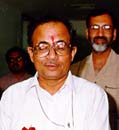

|
|
|
|
| HOME | INFOTECH | HEADLINES | |||
| May 19, 1997 |
Reforming the telecom reformsN Vittal
The National Telecom Policy of 1994 is historic because it was the first document to express the government's desire to welcome competition by giving up the Department of Telecommunication's monopoly over telecom services. The document spelled out priorities like reaching telecom services to 600,000 villages, providing telephones for all or at least putting the service within the reach of all and making India a manufacturing base for telecom products. But more importantly, NTP94 spelled out specific guidelines by which the telecommunication sector had to produce results against deadlines. For example, by the end of the Eighth Plan period on March 31, 1997, the nation should have been able to provide telephone on demand and cover all the 600,000 villages. The question now is that 1997 is here and are we anywhere near meeting the targets? Unfortunately not. This is mainly because in the implementation of the policy, the focus got shifted to tenders. And when the tenders were opened, to license fees. This led to endless delays. Today prominent in the media are discussions on issues like inter-connect charges, setting up of the Telecom Regulatory Authority of India and whether financial institutions should have the right to reassign the licences of parties which fail to discharge obligations. Having been connected with the evolution of the telecom policy in the critical 1993-94 period, I suggest that a time has come to cut the Gordian knot and adopt the following strategy:
(B) The spectrum management is bound to be an important issue, especially because investment from the private sector, initially, will be in wireless technology systems. It is therefore necessary that the entire wireless advisor's office of the ministry of communication come under the ambit of the TRAI. (C) The current thinking is that the chairman of the TRAI should be a Supreme Court judge or the chief justice of a high court. If we look at countries like the United States, the United Kingdom or Australia, where telecom services have been privatised, the chairman of the regulatory authority is not from the judiciary. We will have to cast the net wider and select a suitable person instead of restricting our choice to the judiciary. I do not mean any disrespect to the judiciary, but, looking at the sensitivity of the telecom sector and its future, I would suggest that we should look beyond the judiciary and select the best possible candidate for the post of the TRAI chairman.
If these three restrictions are removed, the telecommunication business will become profitable and the hesitation of financial institutions in funding projects would disappear. III) Despite the tenders and all the hassles we have gone through, hardly 10 of the 20 circles have potential licensees who are still arguing with DoT on various aspects of the letter of intent. In this context I would like to make a radical suggestion. Why not also make basic voice telephony free for competition instead of the present duopoly visualised? After all, for value added services, the government has laid down the entry conditions and any number of players can operate. Of course, when it comes to cellular or paging services, because of radio frequency restrictions, the numbers of players are limited. But for basic voice telephony which can operate through wireline or wireless technologies, why restrict the competition to a duopoly? The United Kingdom, after ten years of duopoly, has gone over to a free market system. India should learn from the United Kingdom and at this intermediate stage do away with duopoly. A point may be raised about the licence fee paid by the current holders of letters of intent. This is a matter that can be easily settled because the new conditions will be applicable to all operators. The amounts already paid by them could be adjusted according to the terms of the new fees prescribed and the government could return the balance amounts to the operators. Today, because of the tendering system, the highest bidders have the licences. Instead, if the government were to lay down lower licence fees based on a realistic assessment of the potential in each circle, companies could compete better.
N Vittal is chairman of the Public Enterprises Selection Board. However, he is best known for his tenure as the secretary of the Telecom Commission and the many revolutionary policies he introduced. |
|
HOME |
NEWS |
BUSINESS |
CRICKET |
MOVIES |
CHAT
INFOTECH | TRAVEL | LIFE/STYLE | FREEDOM | FEEDBACK |
|